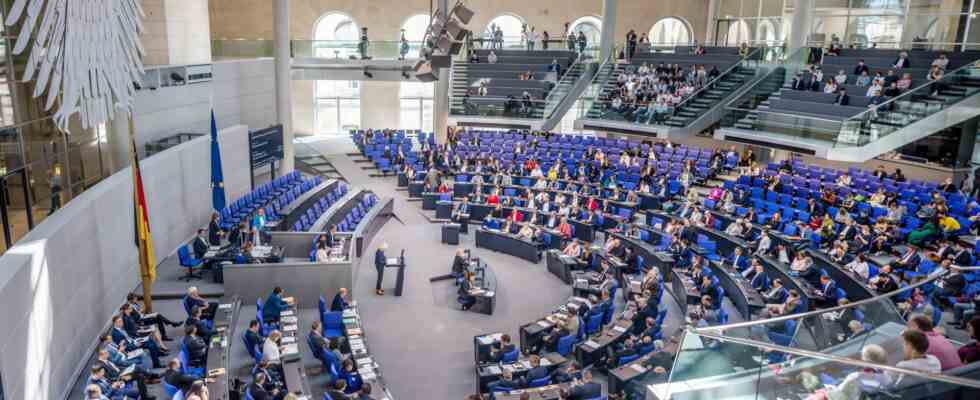As of: 01/15/2023 5:25 p.m
With 736 members of parliament, the Bundestag is larger than ever before. The traffic light government wants to change that. The parliamentary groups have presented a draft law for the electoral reform. The goal: back to the controlled variable.
The SPD, Greens and FDP parliamentary groups have presented a draft law for electoral law reform. According to this, the greatly enlarged Bundestag is to shrink again – to the statutory standard size of 598 MPs.
In the last federal elections, the parliament continued to grow – to currently 736 seats. The reason is overhang and compensation mandates.
Abolish overhang and compensation mandates
According to the draft law, which is available to several news agencies, these are now to be abolished. Overhang mandates arise when a party wins more direct mandates from the first votes than it is entitled to based on the result of the second vote. The latter decides which party gets how many seats in the Bundestag. The party may keep the additional direct mandates.
The other parties receive compensatory mandates in return. In the 2021 federal election there were a total of 138 overhang and compensation mandates. Of these, 41 were from the Union, 36 from the SPD, 24 from the Greens, 16 from the FDP, 14 from the AfD and seven from the Left Party.
“There is no way around a reform of the electoral law,” said Green MP Till Steffen of the “Frankfurter Allgemeine Zeitung”. “This is not just about the ability of Parliament to work and skyrocketing costs. It’s more about the credibility of politics and our country’s ability to reform.”
“Main votes” should decide on the distribution of seats
According to the draft, in the future only the second votes should be decisive for the strength of the parties in the Bundestag – so-called “main votes”. These votes decide how many of the 598 Bundestag seats each party is entitled to nationwide. These places are then occupied by the state lists of the parties and by the “constituency vote”, today’s first vote.
If a party wins fewer constituencies directly with the “constituency vote” than its Bundestag mandates from the “main vote” are entitled to, the remaining mandates are awarded via the state list.
Directly elected MPs could get nothing
However, if the party wins more constituencies directly than it has seats according to the “main votes” result, the candidates with the worst “constituency votes” result get nothing. “Successful candidacy in the constituency will therefore in future require, in addition to the relative majority, coverage by “main votes”,” says the draft law.
The draft provides that the previous division into 299 constituencies will remain. The previous black-red government had decided that the number of constituencies would be reduced from 299 to 280 for the 2025 federal election. If there is no agreement on the electoral law reform, the current legal situation would continue to apply with a reduction in the number of constituencies.
In the future, only the second votes, called “main votes”, will decide on the distribution of seats in the Bundestag.
Image: dpa
Traffic light wants to convince Union
According to the dpa news agency, the chairmen of the traffic light groups sent the draft to Union group leader Friedrich Merz in advance and offered him talks about it.
“The factions of the democratic center are united in wanting to avoid a massive enlargement of the Bundestag beyond its legal standard for future federal elections,” the letter said. “That’s why we want to find a solution for the next federal election that can be widely supported.”
Criticism of plans expected
Even in their own ranks there is likely to be criticism of the plans – because MPs from all parties could lose their mandates in the next election. But the Union could also get in the way – because in the past it has benefited the most from the compensation and overhang mandates and prevented electoral law reforms.
Green negotiator Steffen told the “FAZ” that the traffic light strives for a consensus “as broad as possible” and wants to approach the Union. “Our offer of talks is meant seriously. However, delaying the reform into the next legislature is not an option, a downsizing of the Bundestag is long overdue.”
The parliamentary groups want to discuss the draft law next week. He is then to be introduced into the parliamentary process, which should be completed by Easter. The traffic light expects that the Federal Constitutional Court will also deal with the draft law. The CDU MP Ansgar Heveling warned of an “unconstitutional capping model” and has already threatened to sue in Karlsruhe.
Bundestag to shrink – traffic light presents draft for electoral law reform
Dietrich Karl Mäurer, ARD Berlin, 15.1.2023 5:44 p.m

